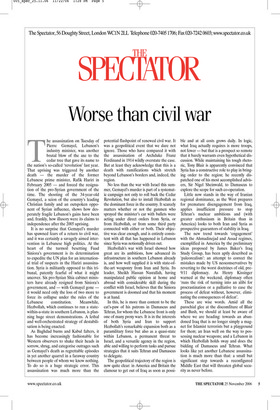Worse than civil war
The assassination on Tuesday of Pierre Gemayel, Lebanon’s industry minister, was another brutal blow of the axe to the cedar tree that gave its name to the nation’s so-called ‘revolution’ last year. That uprising was triggered by another death — the murder of the former Lebanese prime minister, Rafik Hariri in February 2005 — and forced the resignation of the pro-Syrian government of the time. The shooting of the 34-year-old Gemayel, a scion of the country’s leading Christian family and an outspoken opponent of Syrian influence, shows how desperately fragile Lebanon’s gains have been and, frankly, how illusory were its claims to independence after the 2005 uprising.
It is no surprise that Gemayel’s murder has spawned fears of a return to civil war, and it was certainly a savagely aimed intervention in Lebanese high politics. At the heart of the turmoil besetting Fuad Siniora’s government is its determination to expedite the UN plan for an international trial of suspects in the Hariri assassination. Syria is militantly opposed to this tribunal, patently fearful of what it might uncover. Six pro-Syrian Shia cabinet ministers have already resigned from Siniora’s government, and — with Gemayel gone it would need only the loss of two more to force its collapse under the rules of the Lebanese constitution. Meanwhile, Hezbollah, which continues to run a statewithin-a-state in southern Lebanon, is planning huge street demonstrations. A lethal and well-orchestrated strategy of destabilisation is being enacted.
As Baghdad burns and Kabul falters, it has become increasingly fashionable for Western observers to shake their heads in sorrow, shrug, and categorise outrages such as Gemayel’s death as regrettable episodes in yet another quarrel in a faraway country between people of whom we know nothing. To do so is a huge strategic error. This assassination was much more than the potential flashpoint of renewed civil war. It was a geopolitical event that we dare not ignore. Those who have compared it with the assassination of Archduke Franz Ferdinand in 1914 wildly overstate the case. But at least they acknowledge that this is a death with ramifications which stretch beyond Lebanon’s borders and, indeed, the region.
No less than the war with Israel this summer, Gemayel’s murder is part of a systematic campaign not only to roll back the Cedar Revolution, but also to install Hezbollah as the dominant force in the country. It scarcely matters whether or not the gunmen who sprayed the minister’s car with bullets were acting under direct orders from Syria, or from Hezbollah, or from some third party connected with either or both. Their objective was clear enough, and is entirely consistent with all that has happened in Lebanon since Syria was notionally driven out.
Hezbollah’s war with Israel showed how great are its ambitions, how advanced its infrastructure in southern Lebanon already is, and how well supplied it is with state-ofthe-art weaponry from Iran and Syria. Its leader, Sheikh Hassan Nasrallah, having manipulated public opinion at home and abroad with considerable skill during the conflict with Israel, believes that the Siniora government is doomed and that his moment is at hand.
In this, he is more than content to be the cat’s-paw of his patrons in Damascus and Tehran, for whom the Lebanese front is only one of many proxy wars. It is in the interests of both Syria and Iran to support Hezbollah’s remarkable expansion both as a paramilitary force but also as a quasi-state within Lebanon, a permanent threat to Israel, and a versatile agency in the region, able and willing to perform tasks and pursue strategies that it suits Tehran and Damascus to delegate.
The geopolitical trajectory of the region is now quite clear: in America and Britain the clamour to get out of Iraq as soon as possi ble and at all costs grows daily. In logic, what Iraq actually requires is more troops, not fewer — but that is a prospect so remote that it barely warrants even hypothetical discussion. While maintaining his tough rhetoric, Tony Blair is apparently convinced that Syria has a constructive role to play in bringing order to the region; he recently dispatched one of his most accomplished advisers, Sir Nigel Sheinwald, to Damascus to explore the scope for such co-operation.
Little now stands in the way of Iranian regional dominance, as the West prepares for premature disengagement from Iraq, applies insufficient pressure to stop Tehran’s nuclear ambitions and (with greater enthusiasm in Britain than in America) looks to both Iran and Syria as prospective guarantors of stability in Iraq.
The new trend towards ‘engagement’ with the Ahmadinejad and Assad regimes, exemplified in America by the preliminary ideas proposed by James Baker’s Iraq Study Group, has been aptly described as ‘paleorealism’: an attempt to correct the mistakes made by US neoconservatives by reverting to the worst doctrines of old, pre9/11 diplomacy. As Henry Kissinger warned at the weekend, diplomacy often ‘runs the risk of turning into an alibi for procrastination or a palliative to ease the process of defeat without, however, eliminating the consequences of defeat’.
These are wise words. Amid all the parochial glee at the discomfiture of Blair and Bush, we should at least be aware of where we are heading: towards an abandoned Iraq that is no longer simply a magnet for Islamist terrorists but a playground for them; an Iran well on the way to possessing nuclear weapons; and a Lebanon in which Hezbollah holds sway and does the bidding of Damascus and Tehran. What looks like yet another Lebanese assassination is much more than that: a small but significant step towards a reconfigured Middle East that will threaten global security as never before.


























































































 Previous page
Previous page